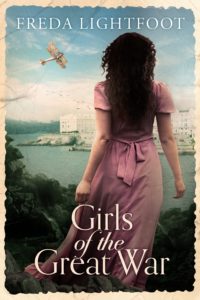Guest post by Freda Lightfoot
Thank you so much for inviting me on your blog. Creating characters, their names and making them believable in whatever book I’m writing, is always fascinating. Their appearance and behaviour comes into my head as I write, but I do try to work out in advance what kind of people they are. What is their main characteristic, and their major flaw? Often the two facets are linked. Independence can easily slip into stubborn obstinacy. Everyone has faults and it is these human failings which can bring a character alive for a reader, and explain their motivation for behaving as they do. Their back story is also important, and how they relate to other people. Mothers do not treat their daughters in the same way as their father, certainly not in Girls of the Great War, but why? She’s a difficult woman who says nothing about her husband. Considering the various problems and viewpoints in a character can help to round them out.
To me, characters always come first. Also, they won’t always perform to my bidding. In Gracie’s Sin, I planned for one of the Timber Girls to have an affair, fearing she’d lost her husband in the war, but she loved him and determinedly remained loyal. Once I know a character thoroughly, who starts to live in my mind, I have to accept who they are and their plan in life. All I have to do is listen to their voice, write down their comments and the rest follows. I know it sounds crazy but that’s how it is. If I try to plot too much in advance, I somehow lose the drive to get the story down.
Though my characters often live in a fictitious village or street, which allows plenty of scope for my imagination about who lives in it and what they do, I put this into as accurate a setting as I can. I enjoy research and spend a great deal of time seeking out those little details to create a sense of reality. I take a great many photographs, draw maps and talk to people who have been involved in the type of industry or lifestyle which I am trying to recreate. I find inspiration and ideas from many sources: family memories, history of the places I’ve lived in such as the beautiful English Lake District and Cornwall. I also interview people, pick up ideas from newspapers, TV, and I have hundreds of books, old magazines, memoirs and documents of all kinds that I squirrel away in case they come in handy one day. A strong sense of place is essential for the kind of sagas and historical fiction I write.
Getting started on a new book takes time. I always have an overview, a beginning, middle and end, although how I will get there takes time for me to decide. I’m not a great plotter and planner. Once I have an idea of the main characters and the premise, I start writing into the mist and see what comes. Usually by chapter four and five I know what the next section will be about. Once I reach three quarters of the way, knowing all the characters well, comes the desire to write the book at greater speed, and then to edit, of course. And of course I do lots of edits and rewrites once the original section is finished.
 Excerpt from Girls of the Great War:
Excerpt from Girls of the Great War:
Chapter One
Christmas 1916
Lights dimmed as a man dressed as Pierrot in a bright blue costume and pantaloons, peaked hat and a huge yellow bow beneath his chin, skipped merrily on to the stage singing ‘All the Nice Girls Love a Sailor’. He was quickly joined by a troop of dancing girls. They too were dressed like Pierrots, all of them looking ravishing in a pink costume with a wide frilled collar, long swirling skirt decorated with fluffy bobbles, and a tight-fitting black hat. They were complete visions of beauty who brought forth roars of excited approval from the audience. Pierrot waved his gloved hands at them, the theatre being packed with British and Belgian soldiers who responded with cheers and whistles.
Cecily smilingly watched from the wings as she loved to do most evenings. A part of her ached to join the singers, something her mother would never agree to. Viewing herself as the star performer she expected her daughters to wait upon her hand, foot and fingers. Not that Cecily believed herself to be a good assistant, being too involved with working as a conductor on the electric trams now that most men were caught up in the war. Her mother disapproved of that. Cecily, however, firmly believed in making her own choices in life.
Feeling a gentle tap on her shoulder, she found her sister at her side. ‘Her royal highness Queenie requires your assistance,’ Merryn whispered, her pretty freckled face wrapped in a jokey grin. ‘I’ve been dismissed, as she’s engaged in her usual bossy mood.’
‘Oh, not again!’ Stifling a sigh, Cecily accompanied Merryn back to the dressing room. Gazing in the mirror she recognised the familiar lack of focus in her mother’s blue eyes, proving she’d again been drinking. Despite seeing herself as a star, Queenie too often felt the need to overcome a sense of stage fright before she performed.
‘Merryn has made a total mess of my hair,’ she stuttered in a slurry voice.
‘I’m sure she didn’t mean to, Mama,’ Cecily calmly remarked, and reaching for a brush began to divide her mother’s curly blonde hair across the back of her head.
‘Never call me by that name. You know how I hate it.’
She’d chosen to name herself Queenie years ago as she considered it more appropriate for her career than Martha, the name she was born with. And that was what she required her daughters to call her, having no wish to be reminded of her age. Merryn seemed to accept this. Cecily always felt the need to remind her of their true relationship, which irritatingly was not an easy one. She carefully twisted up a small strand of her mother’s hair and clipped it, then tucked the other portions neatly around before pinning them together with a glittering silver hair slide on the top of her head.
Grabbing a curl, Queenie pulled it down to loop it over her left ear. ‘I’ve no wish for my hair to be all pinned up. Flick some over my ears.’
‘I thought you liked to look as neat and tidy as possible, Mama,’ Cecily said.
‘No, fluff it out, silly girl. How useless you are.’
Cecily felt quite inadequate at this job and checked her success or lack of it by viewing her mother in the mirror. She was a slender, attractive woman with a pale complexion, pointed chin and ruby lips frequently curled into a pout, as they were doing now. But she was also vain, conceited, overly dramatic, emotionally unstable, selfish, overbearing and utterly neglectful. Queenie was never an easy woman to please, even when she was stone-cold sober. She was an exhibitionist and a star who demanded a great deal of nurturing and support, a task Merryn was extremely skilled and happy to do, save for when Queenie was completely blotto, as she was now. And having been scolded and dismissed countless times when her mother was drunk, her sister would sit in the corner reading Woman’s Weekly, taking not the slightest interest. Once Queenie sobered up she would happily treat her younger daughter as her favourite child in order to make Cecily feel unwanted, even though she’d done her best to help. Not that she ever felt jealous about this, always eager to act as a surrogate mother towards her beloved sister as Queenie could be equally neglectful of them both, wrapped up in herself and her tours.
Blurb
Cecily Hanson longs to live life on her own terms—to leave the shadow of her overbearing mother and marry her childhood sweetheart once he returns from the Great War. But when her fiancé is lost at sea, this future is shattered. Looking for meaning again, she decides to perform for the troops in France.
Life on the front line is both rewarding and terrifying, and Cecily soon finds herself more involved—and more in danger—than she ever thought possible. And her family has followed her to France. Her sister, Merryn, has fallen for a young drummer whose charm hides a dark side, while their mother, Queenie—a faded star of the stage tormented by her own secret heartache—seems set on a path of self-destruction.
As the war draws to a close and their hopes turn once again to the future, Cecily and Merryn are more determined than ever to unravel the truth about their mother’s past: what has she been hiding from them—and why?
Buy links:
Amazon UK: https://amzn.to/2wKaX2y
Amazon US: https://amzn.to/2rGc528
 Girls of the Great War by Freda Lightfoot
Girls of the Great War by Freda Lightfoot
My rating: 5 of 5 stars
I was sent a copy of this book in exchange for my honest review. I was not financially compensated, and all opinions are 100 percent mine.
First of all, I absolutely LOVE historical fiction. It is my favorite fiction genre. I tend to have high expectations for this beloved genre of mine, and I will tell you that this book never disappointed. From the beginning, I was hooked. Be advised this is written by a British author, but that only added to the charm of this tale.
I have almost no cautions concerning the content of this book. There is no overt profanity. Sex is implied, and the reader gets a brief glimpse into the bedroom at times, but I never felt it was offensive in any way. It was tasteful without the detailed description sometimes found in contemporary and historical romances.
I salute the author for creating such phenomenal, three-dimensional characters. I adored Merryn and Cecily. There was mystery, intrigue, romance, romance, and a few heart-tugging moments. The author did an incredible job of setting the stage and truly drawing the reader into the world of WWI. In one sense, the tale is rather ordinary, and perhaps in the hands of a less-skilled writer, it would be a bit flat and boring. However, Freda Lightfoot’s expertise made the story entertaining and never vapid in any way. Even until the very end.
While I simply adored so many moments within this well-crafted tale, I loved the fact that the plight of women was emphasized as it demonstrated just how strong these women were during the time. In fact, we should bless each and every one of them who stood up for themselves and broke cultural stereotypes to ultimately push us into the modern era where women were allowed and even encouraged to work.
My other favorite part is the twist the author propels into the mix towards the end of the story. I won’t spoil it here, but I advise all readers to read all the way until the conclusion of the book. You’ll be glad you did!
My Biography
 I was born in a small mill town in Lancashire. My mother comes from generations of weavers, and my father was a shoe-repairer. I still remember the first pair of clogs he made for me. After several years of teaching, I opened a bookshop in Kendal, Cumbria. And while living in the rural Lakeland Fells, rearing sheep and hens, I turned to writing. I wrote over fifty articles and short stories for magazines such as My Weekly and Woman’s Realm, before finding my vocation as a novelist and became a Sunday Times Bestselling author. I’ve now written over forty-eight novels, mostly sagas and historical fiction, my three latest books, including Girls of the Great War, out in May are published by Amazon Lake Union. I spend warm winters living in Spain, and the rainy summers in Britain.
I was born in a small mill town in Lancashire. My mother comes from generations of weavers, and my father was a shoe-repairer. I still remember the first pair of clogs he made for me. After several years of teaching, I opened a bookshop in Kendal, Cumbria. And while living in the rural Lakeland Fells, rearing sheep and hens, I turned to writing. I wrote over fifty articles and short stories for magazines such as My Weekly and Woman’s Realm, before finding my vocation as a novelist and became a Sunday Times Bestselling author. I’ve now written over forty-eight novels, mostly sagas and historical fiction, my three latest books, including Girls of the Great War, out in May are published by Amazon Lake Union. I spend warm winters living in Spain, and the rainy summers in Britain.
Website: www.freda@fredalightfoot.co.uk
Facebook: http://www.facebook.com/pages/Freda-Lightfoot-Books/149641371839646
Twitter: @fredalightfoot
Goodreads: https://www.goodreads.com/author/show/448774.Freda_Lightfoot
My Blogspot: http://www.fredalightfoot.blogspot.com/
If you wish to be kept up to date on new titles and contests, sign up on my website http://www.fredalightfoot.co.uk to subscribe to my Newsletter: I only send out 4 or 5 a year so your inbox won’t be flooded.
*****
GIVEAWAY!
Make sure to follow the whole tour—the more posts you visit throughout, the more chances you’ll get to enter the giveaway. The tour dates are here: http://writermarketing.co.uk/prpromotion/blog-tours/currently-on-tour/freda-lightfoot-3/
http://www.rafflecopter.com/rafl/display/8b9ec5be184/
2 Comments
-
Thank you so much for this excellent review, Ruth. Much appreciated.
-
I enjoy historical novels because the romance is always exciting and believable. The characters are always realistic.
Marilyn



